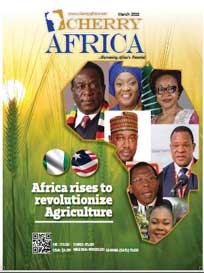The various leaders as well as African Minsters of Agriculture collectively committed to prioritize efforts to address and protect vulnerable populations from the worsening food insecurity as a result of the global food crisis and to strengthen resilience in agriculture and food systems in Africa. The African Union Commission in partnership with the International Federation of Red Cross and Red Crescent Societies (IFRC), the Food and Agriculture Organization of the United Nations (FAO) and the African Development Bank (AfDB) co-convened the high- level conference to advocate for political, humanitarian and financials support as long-term needs and durable solutions to the persistent food insecurity on the continent.
The High-Level Food Security and Nutrition Conference convened on 10th October 2022, which brought together over 300 delegates at the African Union Headquarters in Addis Ababa, highlighted the importance of collaboration and cooperation in fast-tracking efforts to mobilize the political, humanitarian, and financial support to respond to the various shocks currently affecting the continent’s agriculture and food systems.
The high-level delegates and African Minsters of Agriculture declared their commitment to support sustainable food security, transforming food systems, and building a viable, commercial, and productive agricultural ecosystem in Africa. They expressed their determination to channel more investment and resources to agriculture and committed to building stronger partnerships within and outside Africa towards new commitments that will contribute to comprehensive responses to the prevailing food insecurity and malnutrition crises in many parts of the continent.
In her opening remarks, H.E Amb. Josef Sacko stated that “Africa is no doubt facing one of the most alarming food crises in decades. We need to act with urgency and at scale in responding to the current food insecurity and nutrition crisis exacerbated by Russia’s invasion of Ukraine, climate shocks, regional conflicts and the COVID-19 pandemic. She requested the conference to make recommendations that will feed into the Presidential Conference on Food Insecurity slated for early next year, build on the Africa Common Position on Food Systems, and feed into Africa’s position at the COP27 on impacts of climate change on food and nutrition security in Africa.
Mr. Francesco Rocca, President of the International Federation of Red Cross and Red Crescent Societies (IFRC) stated that “hunger is something that being witnessing every day and given the scale of the present food crisis, it’s evident that no country, organisation or institution can handle this alone.” To mitigate this situation, he further called on stronger partnerships as demonstrated at this High-Level Conference and stressed that this is the foundation for succeeding in strengthening immediate response and long-term solutions. Sighting that the IFRC provided cash and food assistance in 2021 by to 4.8 million people and the organization continues to scale up response through the launch of a regional emergency appeal for 200 million CHF that covers 23 affected countries with a focus on reaching 7.6 million people in 14 priority countries. He also advocated for scaling-up efforts to meet the humanitarian imperative across the continent and committed to the common goal of achieving Zero Hunger, a big ambition for all of to deliver against the Sustainable Development Goals and Africa Agenda 2063.”
Dr. Abebe Haile-Gabriel ADG/Regional Representative for Africa, Food and Agriculture Organisation of the United Nations (FAO) noted that “Africa is moving backwards in its efforts to end hunger, food insecurity and malnutrition. One in five people in Africa is going hungry and more than a billion Africans cannot afford a healthy diet.” He indicated further that “The good news is that we have solutions that work. It is encouraging to note that governments are taking actions to respond to these challenges and international partners have been putting in place mechanisms and facilities to support those efforts to reinforce priorities identified in the food systems national pathways, and not to re-invent the wheel or duplicate efforts. He re-iterated that we need to work together, complement each other’s efforts, while recognizing and supporting national and regional African leaderships and scale up proven solutions.
Dr, Martin Fregene, the Director, Agriculture and Agro-Industry at the African Development Bank (AfDB), spoke on behalf of Dr. Beth Dunford, Vice President, Agriculture, Human and Social Development, The African Development Bank informed that the 3 C’s of COVID-19, Climate Change and Crisis of the Russia-Ukraine war) convulsed food production, food prices and food supply on the African continent, resulting in astronomical increase in household budgets for food. The AfDB working with AU and several other partners are assisting Africa to take advantage of its vast savannas, numerous rivers and manpower to transform the continents land into bread baskets for itself and other. He indicated further that on May 23 2022, the AfDB Board of Directors approved 15 Billion US dollars for an African Food Production Plan. In a bid to implement the plan, the AfDB in collaboration with the AU held a high-level meeting with African Ministers of Agriculture and Finance, to ensure that Africa does not suffer from the 30 million loss of food from Russia and Ukraine. The Bank has so far approved 25,000 individual loans and grants worth 1.3 billion dollars to provide 20 million farmers with fertilizer and seeds to raise local food production. He invited participants to join a meeting in Dakar scheduled for January 2023 to mobilize commitment for raising food production in Africa and fixing the structural problems t confronting the continent.
As a result of the catastrophe unfolding in the Horn of Africa which has endured four consecutive episodes of severe drought and a fifth one is in the offing, a special ministerial session on the Horn was organised as part of the event. The session which was addressed mainly by Ministers and Partners in the subregion noted that Ethiopia, Kenya and Somalia make up 2 percent of the world’s population, yet these three countries are home to 70 percent of the world’s most extreme food insecure. Over 18 million people across Somalia, Ethiopia and Kenya are already on the verge of starvation—half of them children and women while some were already dying. Yet, the crisis has struggled to attract the attention and funding it desperately requires.
The report of the Civil Society Organizations (CSO) forum on food security and nutrition that preceded the conference was also presented. The forum brought together local, national, and regional, humanitarian and development actors, including women, youth and refugees. The report highlighted the need for development partners and national government to work together to raise ambitions, align approaches, minimize duplication, and maximize resources to address the current crisis in the immediate medium and long-term in recognition of the critical role of civil society in tackling the food security crisis now and in the years to come and to explore, discuss, and agree on locally led solutions.
The call to action was presented by Commissioner Josefa Sacko, calling on the all stakeholders to build on the AU theme of the year to build resilience in nutrition and food security, by prioritizing and intensifying action to alleviate the current food security challenges on the continent; leverage all platforms such as the COP27; and to reinforce the commitment to achieve zero hunger by investing in nutrition and resilience in food system especially by countries affected by conflict and climate change. She also called for increase commitment in supporting the African union normative frameworks and declaration to eradicate African vulnerabilities in the agriculture sector, mitigate food security and malnutrition on the continent and support to the Comprehensive African Agriculture Development Programme(CAADP) initiative.
In closing, Dr. Agnes Kalibata, the President of Alliance for a Green Revolution in Africa (AGRA) commended the Africa Union, and its International partners and other stakeholder that came together to organize the conference for the success achieved and their commitments to end the food crisis on the continent.















